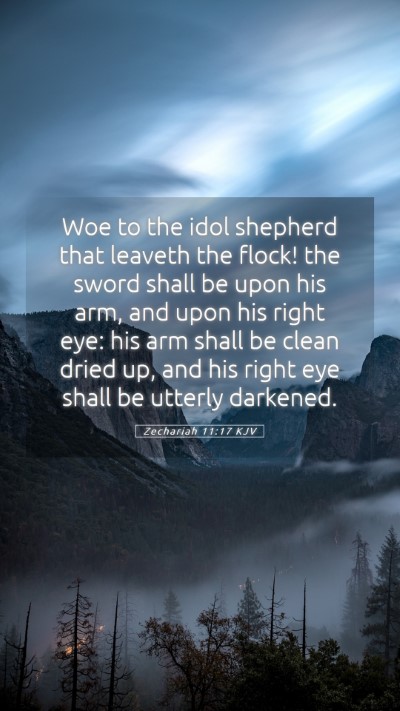Old Testament
Genesis Exodus Leviticus Numbers Deuteronomy Joshua Judges Ruth 1 Samuel 2 Samuel 1 Kings 2 Kings 1 Chronicles 2 Chronicles Ezra Nehemiah Esther Job Psalms Proverbs Ecclesiastes Song of Solomon Isaiah Jeremiah Lamentations Ezekiel Daniel Hosea Joel Amos Obadiah Jonah Micah Nahum Habakkuk Zephaniah Haggai Zechariah MalachiZechariah 11:17 Meaning
What is the meaning of Zechariah 11:17?
Woe to the idol shepherd that leaveth the flock! the sword shall be upon his arm, and upon his right eye: his arm shall be clean dried up, and his right eye shall be utterly darkened.
Zechariah 11:17 Bible Verse Meaning
Understanding Zechariah 11:17
Zechariah 11:17 states: "Woe to the shepherd that leaveth the flock! The sword shall be upon his arm, and upon his right eye: his arm shall be clean dried up, and his right eye shall be utterly darkened."
This verse carries a profound message regarding the responsibilities of leadership, particularly that of a shepherd, which is often used symbolically for the leaders of God's people.
Bible Verse Meanings and Interpretations
This verse has been the subject of various bible verse commentaries and analyses, notably from renowned commentators:
- Matthew Henry: Emphasizes that the "shepherd" symbolizes leaders who fail in their duty to care for their flock. He highlights the severe consequences that arise from neglecting responsibilities, portraying the leader as spiritually blind and weakened.
- Albert Barnes: Discusses the prophetic nature of this verse, linking the shepherd's downfall to the fate of Israel’s leaders. His commentary focuses on the importance of leaders being vigilant and not abandoning their people, warning of dire repercussions if they do.
- Adam Clarke: Explains the imagery used in this verse, where the "sword" represents judgment. Clarke notes the physical afflictions described (the "dried up arm" and "darkened eye") symbolize the total incapacitation of ineffective leaders and the ultimate futility of their governance.
Understanding Scripture Through Context
The context of Zechariah's prophecy sheds light on the historical backdrop in which it was written. Leaders who forsake their duties expose themselves to divine retribution and lead their followers astray.
In Biblical exegesis, this verse is seen as a critique of the faithlessness of those in power. It reflects a broader theme in Scripture where shepherds (leaders) are responsible for their flock (the people) and must act righteously.
Key Themes and Lessons
- Leadership Responsibility: Leaders are called to guide and protect their people. Abandoning this role leads to serious consequences, as mentioned in Zechariah 11:17.
- Divine Judgment: The metaphorical use of the sword indicates that God's judgment is inevitable for those who fail in their stewardship.
- Spiritual Blindness: The "darkened eye" symbolizes a lack of spiritual insight that results from negligence in leadership.
Application of Zechariah 11:17 in Daily Life
This verse prompts reflection on how one approaches leadership, whether in religious, professional, or personal spheres. It encourages individuals to take their responsibilities seriously and to strive for guidance that is both wise and compassionate.
Cross References
- Jeremiah 23:1-2 – Woe to the shepherds who destroy and scatter the sheep.
- Ezekiel 34:10 – The Lord will hold the shepherds accountable for their actions.
- John 10:11 – Jesus refers to Himself as the good shepherd who lays down His life for the sheep.
Conclusion
Zechariah 11:17 serves as a significant warning regarding the duties of those in positions of leadership and authority. By studying and understanding this verse through Bible study resources, individuals can appreciate the deeper meaning behind the prophecy and its implications for leadership today.
Further Study and Resources
For those interested in delving deeper into the meanings of Bible verses, consider engaging in bible study groups or utilizing bible study guides. Resources such as online Bible study platforms can also provide valuable insights into understanding difficult Bible passages.
Equipped with these interpretations and insights, individuals can engage in bible study lessons that not only enrich their understanding of scripture but also apply these lessons to their lives.


